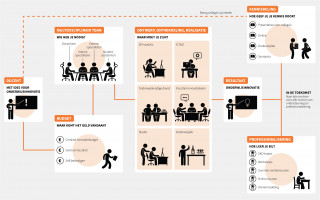Educational innovators who wish to help lecturers bring about educational innovation with IT will find inspiration and decision aids here. A number of higher education institutions have investigated how they enable instructors to innovate their teaching.
Roadmap for organising teacher support
When an lecturer wants to innovate their teaching, for example by creating an online course, they can go through the steps in the illustration below. The purpose of the illustration is to show how an institution can organise this process and where choices can be made. Although the steps are now in a certain order, in practice they may be different.

Roadmap for organising teacher support
View the roadmap in full (in Dutch)
Budget
Educational innovation requires money. It can be paid for from a central (innovation) budget, from the faculty's budget, or from the lecturer's own budget. It is important for an institution not only to make choices about funding educational innovation but also to support the lecturers who are designing the innovation.
Multidisciplinary team
Educational innovation requires a number of people with different areas of expertise. These might include educationalists, studio staff, virtual reality specialists, or directors. An institution can opt to hire certain expertise and/or supplement this with the professionalisation of lecturers and/or the hiring of student assistants.
Design, development and realisation
In every implementation of an idea, there is a design, development and realisation phase. There are several possibilities for teachers to go through this phase. There may, for example, be a study, a teaching lab, or a faculty innovation team that supports the lecturer in creating the product. Within an institution, choices need to be made as to where the phases take place: at a separate studio or at the faculties themselves.
The result
The result is not only the idea that has been worked out, for example an online module, but also the educational innovation that it has led to.
Knowledge sharing
For educational innovation, it is important that knowledge is shared. This can be done by giving presentations to colleagues, for example. An institution must make choices as to how knowledge is shared within and outside the institution. To some extent, lecturers will naturally do this themselves, but they can also be facilitated in this by the institution.
Professionalisation
Professionalisation is important for being able to innovate in education. The lecturers can become more professional at various points in the process. During the creation of an online module, for example, mainly by doing. And afterwards by sharing knowledge and attending workshops, for example. An institution has various options for organising this.
Future
Some institutions are working on a future scenario in which many of these components come together. These ideas have not yet been worked out in full. However, they can already serve as inspiration for other institutions that wish to work on this.
